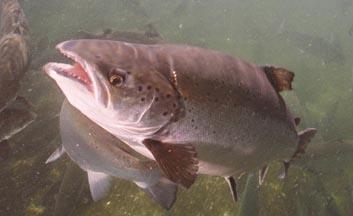UK Scientists Close In on Salmon Virus Resistance Gene
A team of UK researchers are closing in on a gene that affects resistance to a viral disease in Atlantic salmon.

A team of UK researchers are closing in on a gene that affects resistance to a viral disease in Atlantic salmon.
The Infectious Pancreatic Necrosis (IPN) virus is a major killer in commercial salmon farming causing high levels of mortality in young salmon in all markets worldwide. Scientists at the University of Edinburgh (including the world renowned Roslin Institute) and the Institute of Aquaculture at the University of Stirling are collaborating with Geneticists at Landcatch Natural Selection Ltd (LNS), the UK-based International Salmon breeding company to find this gene.
The team were first to publish evidence of the presence of an IPN resistance gene in 2008; the beneficial version of the key gene appears to essentially prevent the death of salmon from IPN. For the first time in aquaculture, LNS used these results to apply marker-assisted selection, an advanced form of selective breeding, to improve resistance to IPN in their commercial strains.
The collaboration has continued with work underway to find the precise location of the gene in the salmon genome. New methods, based on the use of novel DNA sequencing technologies, were used to identify additional genetic markers, closer to the resistance gene. These improved Single Nucleotide Polymorphism (SNP) markers have recently been applied to families from the LNS breeding programme to select the most resistant fish for breeding.
By using the latest DNA sequencing technology, we have now identified improved genetic markers which are accurate predictors of IPN survival in aquaculture salmon populations. This brings us much closer to identifying the gene responsible for resistance.
While researchers at Roslin and Stirling concentrate on finding the gene, geneticists at LNS are using the new markers to further improve their ability to identify salmon resistant to IPN for breeding.
Our work with Roslin and Stirling has allowed continuous improvement in the technology being used on breeding farms in Scotland, Chile and Norway.
We have been able to identify fish genetically resistant to IPN in our own and customer breeding programmes using natural methods, without resorting to Genetic Modification.
Such work shows that leading-edge genetic and genomic technology can be applied to modern selective breeding of farmed salmon to sustainably improve health, welfare and performance.
Further Information:
Landcatch Natural Selection Ltd and its sister company Landcatch Ltd apply selective breeding to develop improved strains of Atlantic salmon for supply to customers around the world. Advanced genetic and genomic methods are applied to pedigree breeding stock in Scotland and to customer breeding programmes around the world. The Landcatch breeding programme aims to deliver sustainable improvement in performance of farmed Atlantic salmon by selective breeding for balanced improvements in disease resistance, welfare and efficiency.
The Roslin Institute is a Biotechnology and Biological Sciences Research Council (BBSRC) National Institute of Bioscience associated with the University of Edinburgh's Royal (Dick) School of Veterinary Studies (R(D)SVS), the number one-ranked Veterinary School in the UK in the 2008 Research Assessment Exercise.
The Roslin Institute aims to enhance the lives of animals and humans through world class research in animal biology and its mission is to gain fundamental understanding of genetic, cellular, organ and systems bioscience underpinning common mechanisms of animal development and pathology, and to drive this into prevention and treatment of important veterinary diseases and develop sustainable farm animal production systems.
The Institute of Aquaculture is internationally recognised for research and post-graduate training, and is a world leader in fish health management. It regularly provides advice to the Scottish Government, and was a major contributor to the SEERAD "Strategic Framework for Scottish Aquaculture" and the EU "Strategy for the sustainable development of European Aquaculture". The IoA has evolved with the aquaculture industry and its research output contributes directly to improved fish survival, increased productivity and profitability.
For more information please contact:


